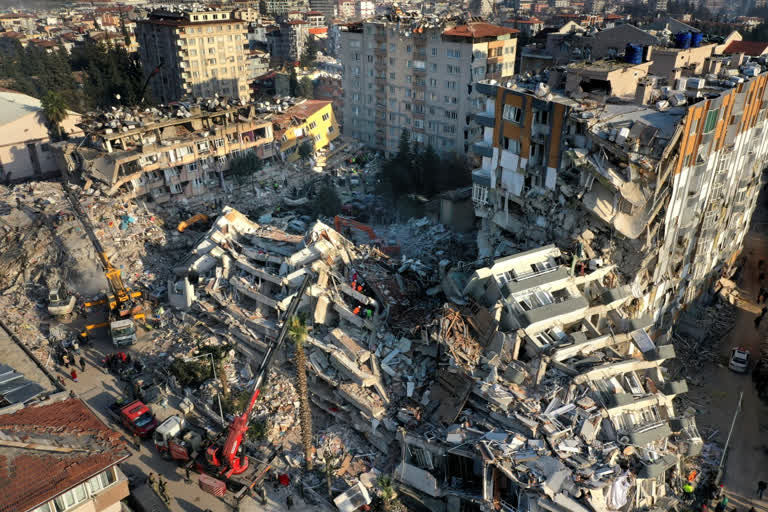Ankara (Turkey): India's Ambassador to Turkey Virander Paul on Sunday said that the mortal remains of the only Indian found dead in a hotel after the deadly earthquake in Turkey are in process of being sent to his family in Uttarakhand. Terming the development as 'unfortunate', Paul said, "We are in the process of earliest transportation of his mortal remains to India. Indian embassy in turkey is in direct touch with the victim's family."
The deceased Vijay Kumar, a native of Kotdwar in Uttarakhand, was on a business trip to Turkey when the earthquake brutally hit the country. Vijay was missing since the earthquake struck, and was found crushed under the debris of a hotel in Malatya on Saturday. He had left Kotdwar on January 23.
The Indian embassy in Turkey took to Twitter on Saturday to inform that the mortal remains of Kumar have been found. "We inform with sorrow that the mortal remains of Shri Vijay Kumar, an Indian national missing in Turkiye since the February 6 earthquake, have been found and identified among the debris of a hotel in Malatya, where he was on a business trip," the Embassy said in a tweet.
The Embassy further said it is in talks with the Turkish Government about the clearance and other documentation work to send the mortal remains as soon as possible through commercial flights. The Ministry of External Affairs had said earlier this month that 10 Indians were struck in remote parts of Turkey after the country was hit by two "biggest natural disaster" earthquakes, out of which 9 have been reported safe while one is missing.
Kumar's family members, in deep shock, are bracing themselves for his final rites as soon as his mortal remains arrive in India. Relatives and acquaintances have been flooding Kumar's Kotdwar residence to express their condolences. Vijay Kumar is survived by his mother, wife, and six-year-old child. He had lost his father about one and a half months back.
Also read: Two-month-old baby survives for 128 hours under rubble in quake-hit Turkey
Six days after the massive earthquake killed more than 30,000 in Syria and Turkey, the nation continues to deal with sorrow and disbelief alike. Many are angered claiming that the response to the historic disaster has been ineffective, unfair and disproportionate. They are expressing frustration over the operations proceeding painfully slowly.
As aid continued to arrive Saturday from various countries, a 99-member group from the Indian Army’s medical assistance team began treating the injured in a temporary field hospital in the southern city of Iskenderun, where a main hospital was demolished. One man, Sukru Canbulat, was wheeled into the hospital, his left leg badly injured with deep bruising, contusions and lacerations.
Wincing in pain, he said he was rescued from his collapsed apartment building in nearby Antakya within hours of the quake. But after receiving basic first aid, he was released without getting proper treatment. “I buried (everyone that I lost), then I came here,” Canbulat said, counting his dead relatives. “My daughter is dead, my sibling died, my aunt and her daughter died, and the wife of her son” who was 8½ months pregnant.
A large makeshift graveyard was under construction in Antakya's outskirts on Saturday. Backhoes and bulldozers dug pits in the field as trucks and ambulances loaded with black body bags arrived continuously. Soldiers directing traffic on the busy adjacent road warned motorists not to take photos. The hundreds of graves, spaced no more than 3 feet (a meter) apart, were marked with simple wooden planks set vertically in the ground. (With Agency Inputs)



